7 Best ERC20 Wallets in 2024 – The Complete List
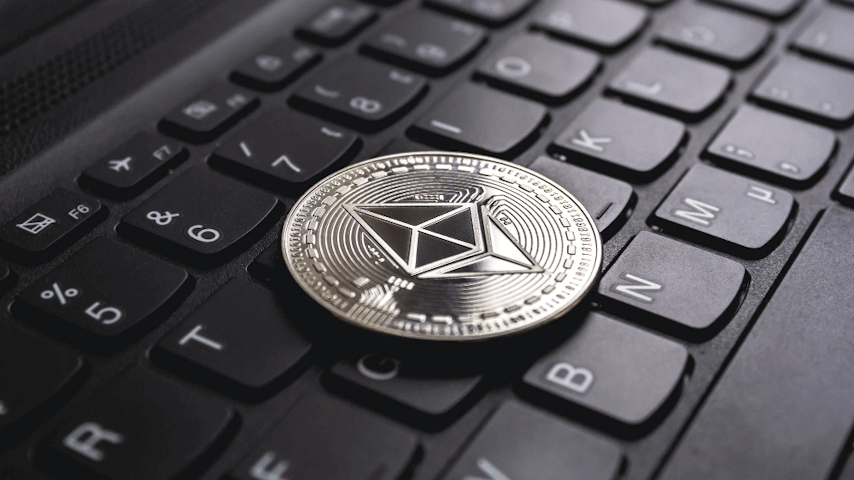
Looking for the best ERC20 wallet but not sure where to start?
There are many considerations that need to be made, such as custodianship, fees, security, supported networks, and whether staking and swapping tools are available.
In this guide, we review the 7 best ERC20 wallets in 2024.
List of the Best ERC20 Wallets in 2024
Listed below are the 7 best ERC20 wallets for investors:
- Best Wallet – The overall best crypto wallet for storing ERC20 tokens, Best Wallet is a non-custodial wallet that offers decentralized storage and token trading through its built-in DEX. However, it is more than just a wallet and also offers staking, enhanced security and unique insights into trending cryptos and early access into new projects. By staking its native token, $BEST – which will be airdropped to active users – users also benefit from fee-free transactions.
- Zengo – A highly-rated ERC20 mobile wallet, that is available for both iOS and Android devices. Zengo supports a wide range of ERC20 tokens, including many of the most popular tokens on the Ethereum network. Zengo is a feature-rich wallet that allows for in-app cryptocurrency trading and purchases, offers support for NFTs on multiple blockchains (including Ethereum), and provides 24/7 customer support.
- Ledger – Considered one of the safest ERC20 wallets, Ledger offers cold storage via a small hardware device. There are three Ledger models to choose from, ranging from $79 to $279. All Ledger models keep private keys offline, so ERC20 token holders can HODL without fear of being hacked.
- Trust Wallet – Compatible with all ERC20 tokens, alongside dozens of other cryptocurrency networks. ERC20 tokens can be added manually via the contract address if it isn’t pre-listed. Trust Wallet offers fee-free staking and token swaps. It also supports ERC20 dApps like Yearn.finance, UniSwap, and OpenSea.
- MetaMask – Another non-custodial wallet that supports all ERC20 tokens. It’s free to use and available as an iOS and Android app. MetaMask also comes as a browser extension for Chrome, Brave, Firefox, and Edge. MetaMask has an in-wallet portfolio dashboard that supports staking and token swaps.
- Coinbase Wallet – A decentralized wallet for iOS and Android users. It supports custom tokens on various networks, including Ethereum. As such, all ERC20 tokens are supported. There is no requirement to open an account with Coinbase to use its decentralized wallet. In fact, the Coinbase Wallet can be used anonymously.
- Binance – Offers an ERC20 wallet and exchange under one roof. Users simply need to log into their accounts to move funds between the two. Over 350 cryptocurrencies are supported on Binance, including major ERC20 tokens. Binance also offers savings accounts and other DeFi products.
Best ERC20 Wallets: Full Reviews
With an increasing number of ERC20 wallets in the market, knowing which option to go with can be difficult.
To help clear the mist, we will now review the 7 best ERC20 wallets for 2024.
1. Best Wallet – Overall Best Wallet for Storing and Managing ERC20 Tokens
We rank Best Wallet as the overall best ERC20 wallet as it has a built-in decentralized exchange that supports trading for all 450,000+ ERC20 tokens plus those on other chains such as the Binance Smart Chain.
The decentralized, non-custodial, multi-chain wallet also has features that other wallets don’t have, making it more than just a destination to trade and store tokens.

As well as the built-in DEX it has other DeFi features, made possible through holding native ERC20 token $BEST – which is launching soon. The token offers staking rewards and also entitles holders to get reduced fees when trading other tokens.
Best Wallet also features unique insights into trending crypto projects, airdrops and NFT collections and offers early access into new token ICOs and presales.
Moreover, we like that Best Wallet comes packed with security tools – this includes biometrics and multi-factor authentication.
Best Wallet users can swap ERC20 tokens instantly without leaving the wallet. Users can also stake tokens to earn passive rewards. While Best Wallet also supports fiat payments, users should be aware that a 4% fee will apply. Nonetheless, payments are processed by a regulated entity, Wert – licensed in the US and EU.
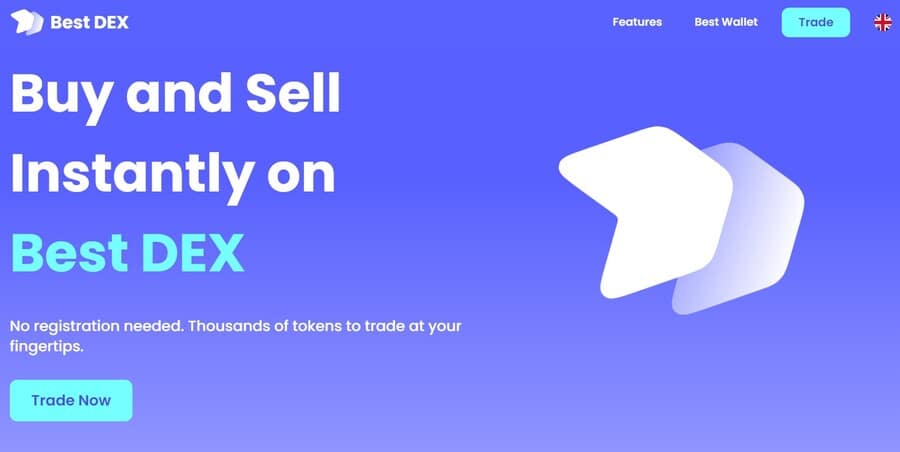
Best Wallet also supports Bitcoin, Dash, Litecoin, Dogecoin, and many other leading cryptocurrencies. This is a decentralized wallet, so users can store, send, and receive ERC20 tokens anonymously. Only the user has access to their private keys, which gives full control of the cryptocurrencies stored.
The wallet has only just launched and not all features are live at the time of writing. However, $BEST tokens will be airdropped to active users in the near future, with 10% of the max supply to be distributed.
| Type of ERC20 Wallet | Custodianship | Supported Coins | Fee to Buy ERC20 Tokens | App? | Staking/Interest? | Staking/Interest Rate |
| Software | Non-custodial | All ERC20 tokens and cross-chain functionality. | Determined by third-party, WERT | Yes | Yes, in-built staking tools and staking of $BEST | TBC |
Pros
- Overall best ERC20 wallet for 2024
- Compatible with all ERC20 tokens – even those unlisted
- Built-in DEX and multi-chain functionality
- Unique insights into new crypto projects, NFTs, airdrops
- Early access to new tokens and reduced fees
- $BEST token airdrop
Cons
- Not all features are live at the time of writing
2. Zengo – Self-Custody Mobile Wallet with Support for Popular ERC20 Tokens
The Zengo mobile wallet is available for both iOS and Android devices, and boasts a rating of 4.78/5 on both the Apple App Store and Google Play Store, with ratings from thousands of customers—to whom it offers 247 support.
Users can buy, sell, and trade over 120+ cryptocurrencies, a list that includes some of the most popular ERC20 tokens in a variety of fields such as DeFi, metaverse, and Layer 2s. Supported tokens include UNI (Uniswap), BAT (Brave Browser), MANA (Decentraland), MATIC (Polygon), and AAVE (Aave). Users can also connect to dApps through the builtin dApp marketplace, which features WalletConnect connections for a smooth and easy dApp experience.
Zengo prides itself on security and, having been active since 2018 and served over 1 million customers, it is yet to have a reported hack.
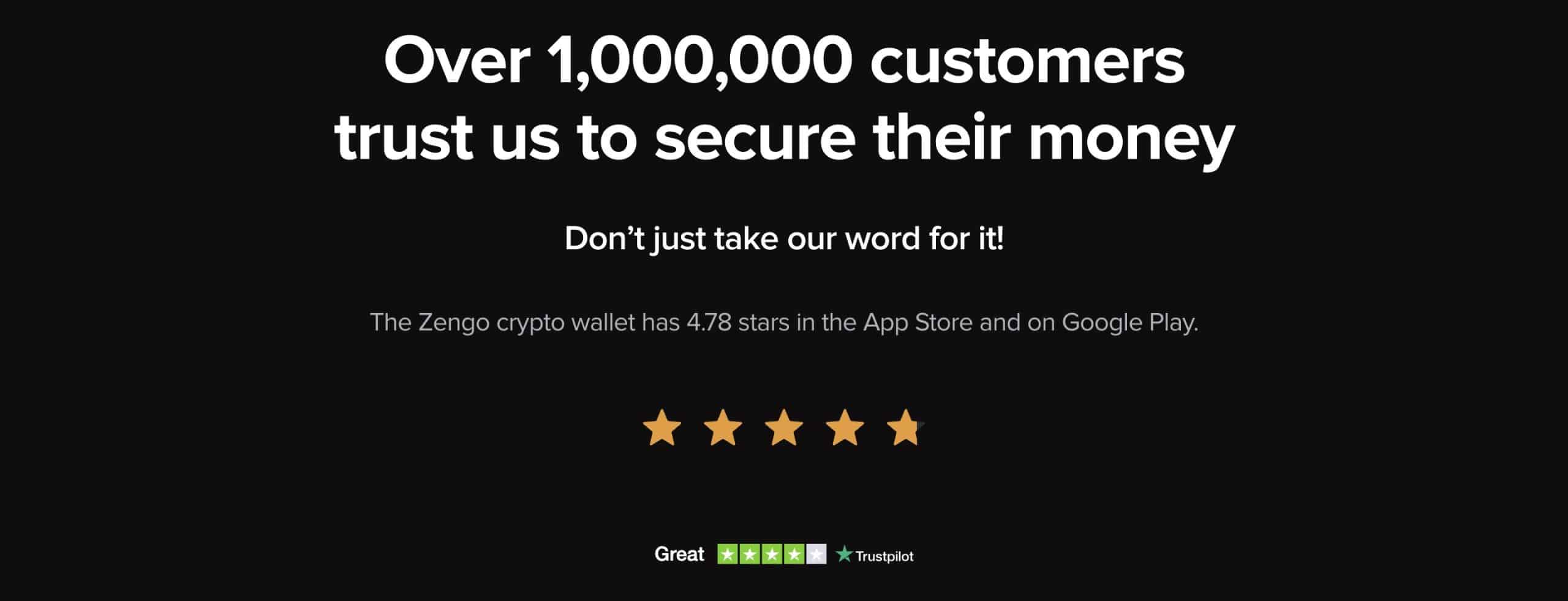
Those looking for extra security for their ERC20 tokens should consider the Zengo Pro version, which features Legacy Transfer, Theft Protection, Web3 Firewall, and Priority Support (with responses typically within 5 minutes). This is priced at $9.99 per month or $69.99 per year, a 40%+ discount.
Over 600 customers have rated Zengo on Trustpilot, where it has a 4.2 star rating. Alongside the most popular ERC20 tokens, Zengo also supports Bitcoin, Dogecoin, Binance Smart Chain, and other top blockchains.
| Type of ERC20 Wallet | Custodianship | Supported Coins | Fee to Buy ERC20 Tokens | App? | Staking/Interest? | Staking/Interest Rate |
| Mobile Wallet | Self-Custody (Non-Custodial) | Dozens of ER20 tokens across numerous industries | Determined by third-party provider | Yes | Not available yet | N/A |
Pros
- Support for numerous ERC20 tokens and other top blockchains
- 24/7 customer support
- Pro version with extra security
- Buy, sell, and trade ERC20 tokens in-app
- High customer rating in app stores and on Trustpilot
- dApp marketplace for connecting to popular Ethereum dApps
Cons
- Does not support most Ethereum Layer 2s
- Does not support all ERC20 tokens
3. Ledger – Hardware Wallet for Storing ERC20 Tokens Offline
Ledger is one of the best ERC20 wallets for security. Unlike the other providers discussed so far, this is a hardware wallet. It comes as a physical device that encrypts the private keys internally. The key safeguard is that Ledger is never connected to the internet. Instead, ERC20 transactions are broadcasted to the network via Bluetooth or a USB cable, depending on the model.
All Ledger models require outgoing transactions to be authorized on the device. This requires the user to enter their PIN. If the PIN is forgotten, the wallet can be recovered with the backup passphrase. This is provided by Ledger when installing the wallet and should be kept on a sheet of paper. The backup passphrase is also required if the Ledger device is lost or stolen.
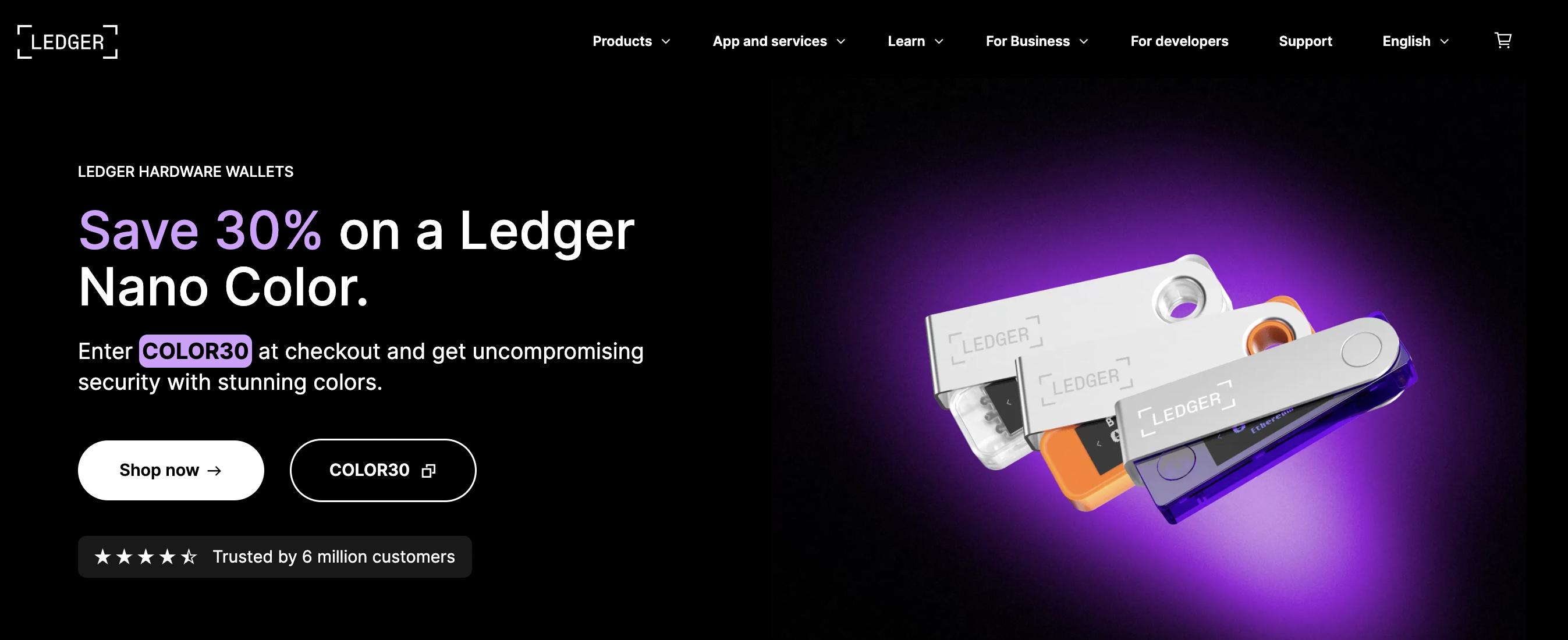
Although Ledger offers one of the safest ERC20 wallets in the market, it is far from convenient. This won’t be an issue for long-term investors, but those wishing to stake or swap ERC20 tokens will find the process cumbersome. The Ledger Nano S Plus is available to buy for $79. The most advanced model – Ledger Stax, retails for $279.
| Type of ERC20 Wallet | Custodianship | Supported Coins | Fee to Buy ERC20 Tokens | App? | Staking/Interest? | Staking/Interest Rate |
| Hardware wallet | Non-custodial | All ERC20 tokens. Also supports other blockchain networks, including Bitcoin, Binance Smart Chain, Tron, Neo, and Polygon. | Fiat payments are handled by Coinify, which charges up to 5% | Yes | Yes, supports some of the best staking coins, including Ethereum, Solana, Cosmos, and Tron | Not published |
Pros
- Leading cold storage wallet for long-term investors
- Never expose the private keys to the internet
- Supports the best altcoins, including all ERC20 tokens
- Reasonable price tag of $79 for the entry-level model
Cons
- Debit/credit card payments cost up to 5%
- Not suitable for investors that trade frequently
4. Trust Wallet – Supports All ERC20 Tokens Plus 70 Other Blockchain Standards
Trust Wallet is a non-custodial ERC20 wallet that is free and simple to use. It supports multiple devices, including browser extensions and smartphones. The latter includes an app for both iOS and Android. Trust Wallet is protected by a PIN and a 12-word passphrase. The passphrase is encrypted on the user’s device, and Trust Wallet cannot access it.
As such, this is one of the best decentralized crypto wallets for storing ERC20 tokens. In fact, we like that Trust Wallet supports custom tokens. In a nutshell, this means any ERC20 token can be added. Moreover, Trust Wallet is integrated with CoinMarketCap. This means that if the ERC20 token is listed on CoinMarketCap, Trust Wallet displays its value in real-time.
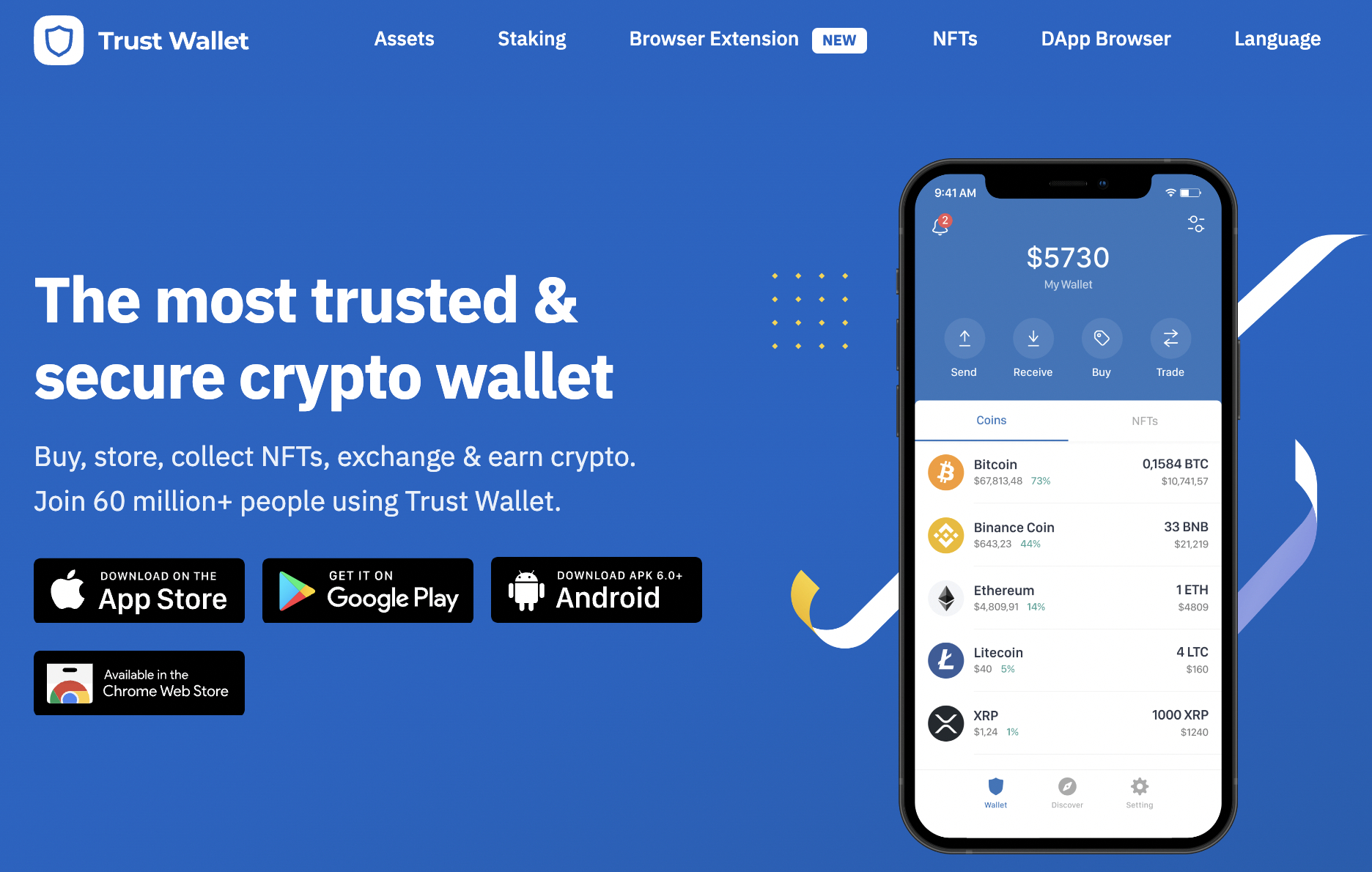
In addition to ERC20 tokens, Trust Wallet supports more than 70 other blockchains. This includes Bitcoin, XRP, Arbitrum, Litecoin, Cardano, and Binance Smart Chain. The Trust Wallet app comes with staking tools and allows users to instantly swap ERC20 tokens. These features are not available on the browser extension.
| Type of ERC20 Wallet | Custodianship | Supported Coins | Fee to Buy ERC20 Tokens | App? | Staking/Interest? | Staking/Interest Rate |
| Browser extension and mobile app | Non-custodial | 4.5 million cryptocurrencies and NFTs across 70 blockchain networks. All ERC20 tokens are supported. | Up to 5%, as transactions are processed by Simplex | Yes | Yes, supports in-app staking without fees. | Up to 19.7% |
Pros
- Best ERC20 wallet for iOS and Android users
- Supports all ERC20 tokens
- Also compatible with 70 other blockchains – including Bitcoin
- No fees to stake or swap ERC20 tokens within the app
- Integrates with CoinMarketCap for real-time portfolio values
Cons
- Simplex handles fiat payments – meaning a fee of up to 5%
- The browser extension comes with limited functionality
5. MetaMask – User-Friendly Browser Extension For Desktop Users
MetaMask is one of the best ERC20 wallets for desktop users. Its browser extension is user-friendly and supports Chrome, Edge, Firefox, and Brave. It takes seconds to download and set up a new MetaMask wallet. Users simply need to choose a strong password and write down their 12-word backup passphrase.
MetaMask comes pre-installed to support the Ethereum network only. This makes it ideal for storing ERC20 tokens in one safe place. If an ERC20 token isn’t initially recognized, users can manually add it via the contract address. MetaMask supports five other networks – Arbitrum, Binance Smart Chain, Optimism, Avalanche, and Polygon.

These networks will need to be added manually, and all native tokens are supported. MetaMask supports staking within its wallet interface, but only for Ethereum. This feature is provided by Rocket Pool and Lido. Users can also swap ERC20 tokens on MetaMask. This attracts a 0.875% fee, built into the exchange rate.
| Type of ERC20 Wallet | Custodianship | Supported Coins | Fee to Buy ERC20 Tokens | App? | Staking/Interest? | Staking/Interest Rate |
| Browser extension and mobile app | Non-custodial | All ERC20 tokens. Also supports the Arbitrum, Binance Smart Chain, Optimism, Avalanche, and Polygon networks. | Between 3-5%, depending on the payment processor. | Yes | Yes, only supports Ethereum | Up to 3.89% |
Pros
- Best ERC20 wallet for non-custodial storage
- User-friendly browser extension for Chrome, Edge, Firefox, and Brave
- Also offers a native mobile app for iOS and Android
- Takes just seconds to set up
Cons
- The only cryptocurrency that can be staked is Ethereum
- Builds a 0.875% fee into token swap transactions
- Does not support Bitcoin
6. Coinbase Wallet – DeFi Wallet App Supporting Any ERCToken
Coinbase Wallet is also one of the best ERC20 wallets in the market. Not only does Coinbase Wallet support any ERC20 token, but also Bitcoin, Solana, Optimism, Avalanche, and more. The wallet is free to download and is available as an app for Android and iOS.
Coinbase Wallet is non-custodial, so only the user can access the private keys. These are stored on the user’s smartphone and come fully encrypted. It is important to remember that Coinbase cannot recover the private keys if they are misplaced. Nor can it help users recover stolen cryptocurrencies if the wallet is compromised.
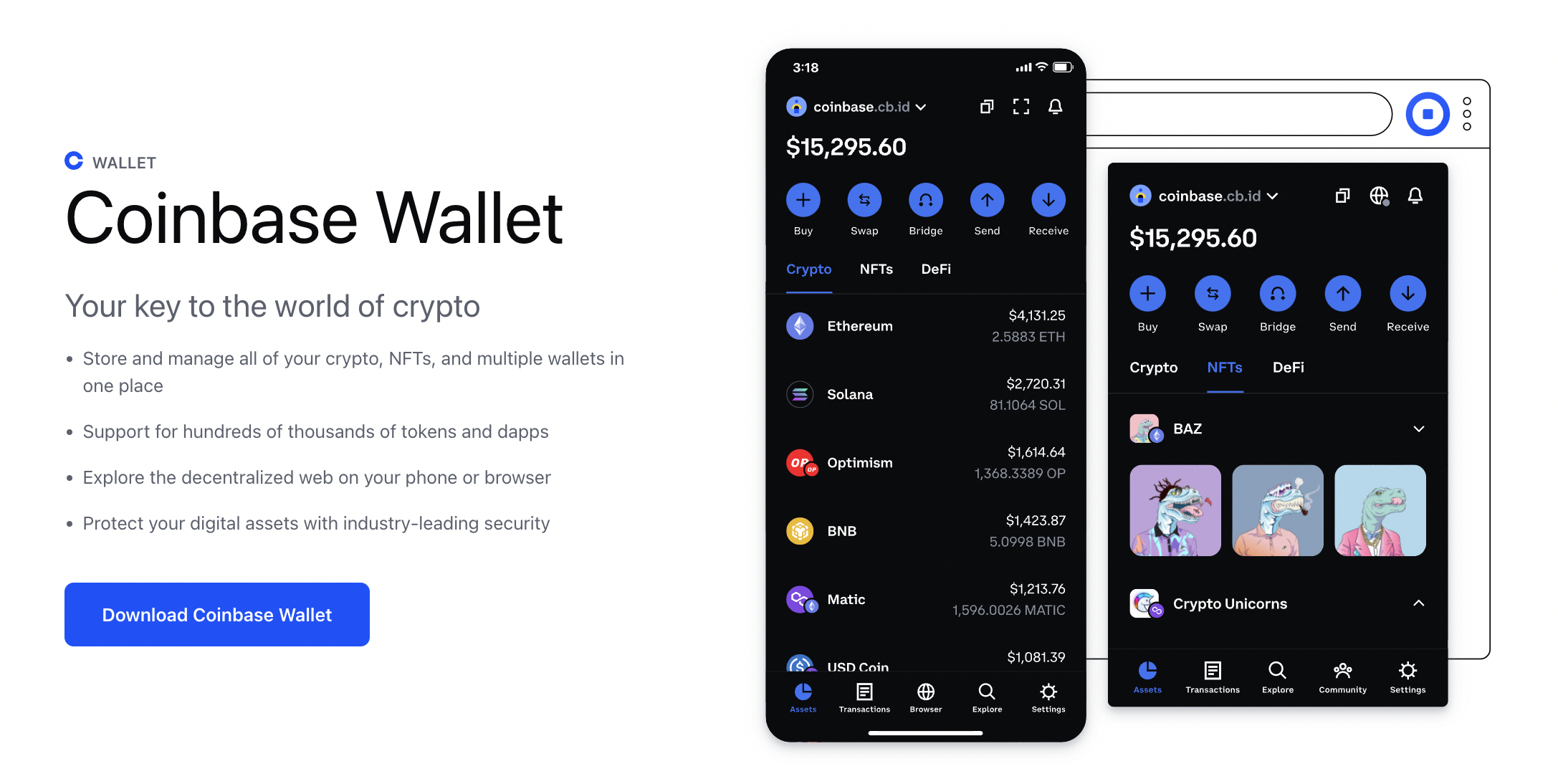
The Coinbase Wallet app is secured by a PIN and biometrics. But there is no support for two-factor authentication or multi-sig permission. On the flip side, we like that Coinbase Wallet supports dApps. This includes OpenSea, PancakeSwap, ENS, SushiSwap, and Curve. The wallet also allows users to buy, sell, and trade NFTs.
| Type of ERC20 Wallet | Custodianship | Supported Coins | Fee to Buy ERC20 Tokens | App? | Staking/Interest? | Staking/Interest Rate |
| Mobile app | Non-custodial | All ERC20 tokens. Also supports other blockchain networks, including Bitcoin, Binance Smart Chain, and Solana. | Fiat payments are not directly supported. This would need to go through the centralized Coinbase exchange – meaning high fees. | Yes | No, but connects to dApps that do support staking | N/A |
Pros
- User-friendly wallet app offering non-custodial storage
- Is compatible with all ERC20 tokens
- Allows users to buy, sell, and trade NFTs
- Connects to dApps on multiple networks
Cons
- Does not have an in-built staking tool
- Limited security features
- No browser extension or desktop software
7. Binance – Popular ERC20 Wallet for Active Traders
Active traders might consider Binance the best ERC20 wallet. This is a centralized wallet that connects to the Binance exchange – so users will not have access to their private keys. Instead, Binance is responsible for keeping client cryptocurrencies safe. The wallet is secured by two-factor authentication, which is required when logging in.
Binance sends a separate code to the user’s cell phone and email, which offers an extra layer of security. By choosing the Binance wallet, users will have access to industry-leading commissions. This amounts to just 0.1% per slide – which is reduced when holding BNB tokens. The Binance exchange has over 350 pairs, including many ERC20 tokens.

Additional ERC20 tokens can be found on the Binance Innovation Zone, which also connects to its wallet. Binance is also a good option for earning yields on ERC20 tokens. This includes liquidity farming, savings accounts, and staking. Binance also allows users to trade leveraged crypto products. The Binance wallet is also compatible with its native app, but fewer features are offered.
| Type of ERC20 Wallet | Custodianship | Supported Coins | Fee to Buy ERC20 Tokens | App? | Staking/Interest? | Staking/Interest Rate |
| Web wallet and mobile app | Custodial | Supports 350+ cryptocurrencies, including many ERC20 tokens. Additional ERC20 tokens can be found on the Binance Innovation Zone. | Fiat payment fees vary depending on the country of residence. Standard commissions amount to 0.1%. | Yes | Yes, supports staking, savings accounts, and liquidity farming. | Up to 19.8% when staking. Up to 32% on savings accounts. |
Pros
- Best wallet for ERC20 token trading
- Some of the lowest trading fees in the industry
- Keeps the majority of client-owned cryptocurrencies in cold storage
- Easily earn yields on ERC20 tokens via staking, savings accounts, and liquidity farming
Cons
- Some DeFi products come with a lock-up of 120 days
- Does not share private keys with users
The Basics of ERC20 Wallets
After investing in an ERC20 project like Tether or Aave, the tokens need to be stored in a crypto wallet. ERC20 tokens can be stored in wallets that support the Ethereum network. Even if the specific token isn’t supported, some ERC20 wallets allow users to add them manually.
ERC20 tokens need to be stored in cryptocurrency wallets that support the Ethereum network. As the world’s second-largest cryptocurrency by market capitalization, this means the number of ERC20 wallets in the market is extensive. Not only that, but there are many different types of ERC20 wallets to choose from.
- For example, while some ERC20 token holders prefer web-based wallets, others feel more comfortable with a hardware device.
- Some investors opt for a mobile wallet app for added convenience.
Either way, ERC20 wallets come with a unique Ethereum address. This address will support all ERC20 tokens. That said, users should check whether custom tokens can be added to the ERC20 wallet. If not, then the user will only be able to deposit ERC20 tokens that are supported. Nonetheless, sending ERC20 tokens to a wallet address takes just 15 seconds on average.
That said, wallet-to-wallet transactions require GAS fees. And when ending ERC20 tokens, GAS fees need to be paid in Ethereum.
- For example, suppose an investor wants to transfer Aave from their ERC20 wallet to an exchange.
- Irrespective of how many AAVE tokens are being sent, the user will need to cover the Ethereum GAS fee.
- This is determined by how busy the Ethereum blockchain is at the time of the transaction.
ERC20 wallets come with a unique password – known as ‘private keys’. But not all ERC20 wallets share this information. This will depend on whether the user opts for a custodial or non-custodial wallet.
Why Do I Need an ERC20 Wallet?
ERC20 wallets provide many different functions. Not only for storing and transferring ERC20 tokens but accessing DeFi products.
Read on to discover why ERC20 investors need a suitable wallet to engage with the Ethereum ecosystem.
Storage
Both short and long-term investors need a safe place to store their ERC20 tokens. This means keeping the tokens off unregulated crypto exchanges.
The best ERC20 wallets offer various security tools to protect the tokens from hackers. For example, custodial wallets usually offer two-factor authentication via SMS and/or email.
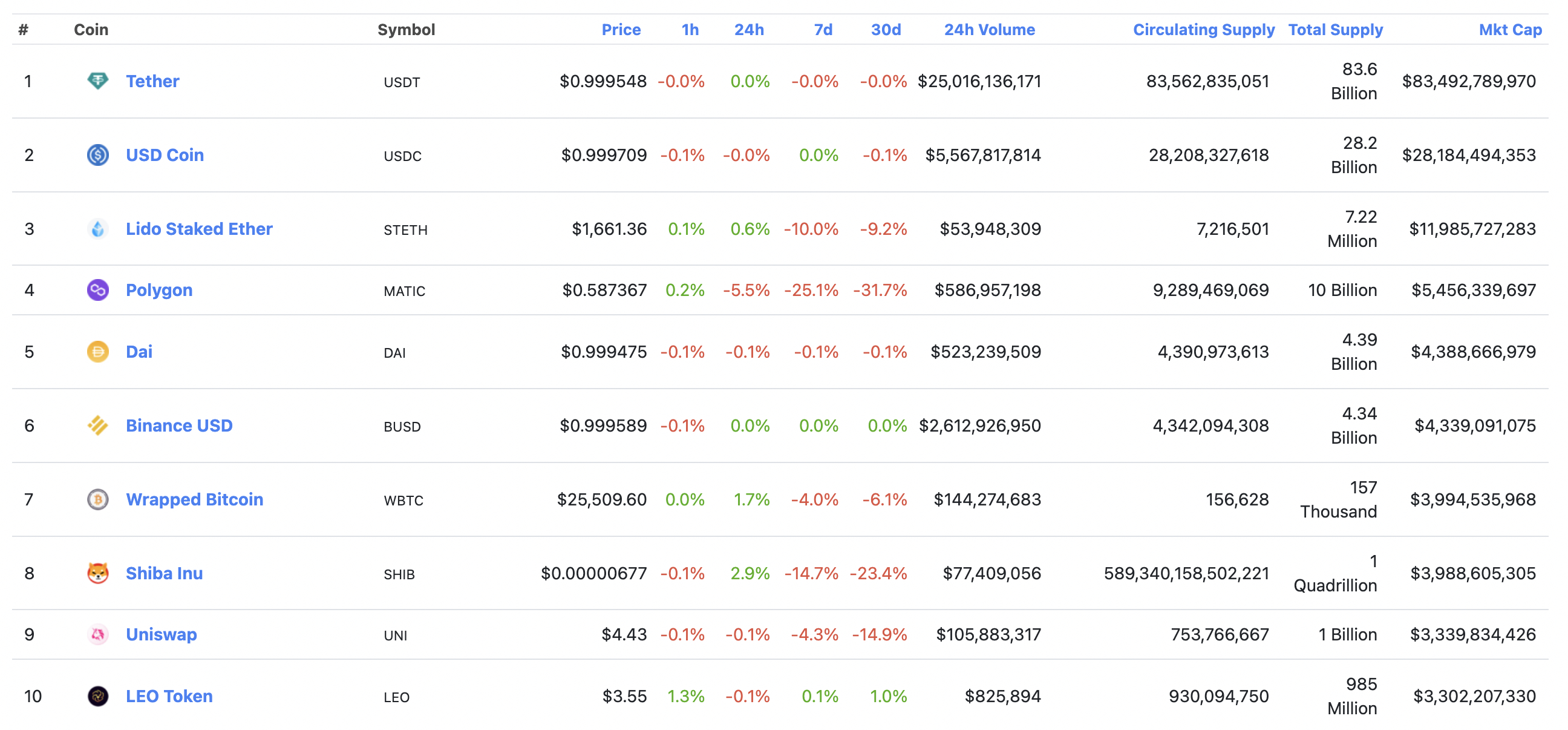
Non-custodial wallets give users control of their private keys, which are usually encrypted on the respective device.
Wallet-to-Wallet Transfers
To send or receive ERC20 tokens, a wallet is needed. Users simply need to provide the Ethereum wallet address when sending ERC20 tokens.
This will be unique to the wallet, but all ERC20 tokens will be sent to the same address.
For example, suppose the user is given the following Ethereum address by their chosen wallet:
0xde0B295669a9FD93d5F28D9Ec85E40f4cb697BAe
In this instance, all incoming ERC20 tokens will be sent to this address.
Ethereum DeFi Ecosystem
The Ethereum blockchain is the go-to network for DeFi platforms. Some of the most popular include UniSwap, Curve, SushiSwap, DODO, OpenSea, and Kine Protocol.
The best ERC20 wallets allow users to connect to DeFi platforms directly. This means users can swap tokens, earn staking rewards, and even borrow funds without leaving the wallet interface.
Fiat Payments
Some ERC20 wallets allow users to buy cryptocurrencies with fiat money. This removes the need to use an external exchange.
Users should, however, keep an eye on fees.
Best ERC20 Wallets: Our Ranking Criteria
While security is a crucial factor when choosing the best ERC20 wallet, other metrics also need to be considered. This includes usability, fees, customer service, supported networks, and core features.
When compiling our list of the best ERC20 wallets, we focused on the following factors:
- Custodianship: First, ERC20 token holders should explore the custodianship of a wallet. This determines whether or not the user has access to their private keys. If so, this is a non-custodial wallet. If not, the wallet is custodial.
- Fees: The best ERC20 wallets do not charge fees for storing tokens. Nor should there be any extra fees for sending transactions. Instead, this should replicate the blockchain GAS fee. Just remember, while software wallets are free to use, hardware wallets need to be purchased.
- Wallet Type: Beginners are best suited for mobile or web-browser wallets, for the convenience on offer. That said, some ERC20 token holders prefer desktop or hardware wallets, depending on their requirements. We covered a broad range of wallet types to suit all needs.
- Supported Coins: Be sure to choose a wallet that supports all ERC20 tokens. The wallet should have a feature that allows users to add a custom token manually. If it doesn’t, the wallet will only support a limited number of ERC20 tokens. Leading ERC20 wallets also support Bitcoin, XRP, Solana, and the best Arbitrum network tokens.
- Security: The primary purpose of an ERC20 wallet is to keep investments safe. This means that the chosen ERC20 wallet should have suitable security features. For example, Best Wallet comes with biometric security.
Overall, the best wallets for ERC20 tokens cover a good blend of security and convenience, plus support for a wide range of ERC20 tokens and features.
How do ERC20 Wallets Work? The Basics
ERC20 wallets come with various fundamentals that should be learned before proceeding. First, investors will be provided with a unique ERC20 wallet address. Not only does this enable them to receive Ethereum, but all ERC20 tokens. This is because ERC20 tokens operate on top of the Ethereum framework. As such, Ethereum and ERC20 tokens use the same wallet standard.
That said, it is important to assess whether the chosen wallet accepts custom ERC20 tokens. If it does, then users can add an ERC20 token to their wallet even if it isn’t listed on an exchange. All the user needs to do is paste the contract address into the wallet. Thereon, any incoming ERC20 tokens transactions will be reflected in the wallet address.

When sending ERC20 tokens to another wallet, the user will need the correct address. If any mistakes are made, the transaction will be sent to a dead wallet address. In other words, the ERC20 tokens will be unrecoverable. Do remember that sending ERC20 tokens requires GAS fees. And as noted earlier, GAS fees must be paid in ETH and not the ERC20 token being sent.
For example, if an investor wants to transfer Dai, they must have enough ETH in their ERC20 wallet to cover transaction fees. This is quoted by the Ethereum network and will vary depending on demand. Currently, ERC20 token transfers cost $1.73 or about 0.0010 ETH. This is considered competitive, as ERC20 GAS fees will often exceed $10.
ERC20 token holders should also be aware of how private keys work. After all, if opting for a non-custodial wallet, private keys are the responsibility of the user. All of the non-custodial wallets discussed today convert private keys to a 12 or 24-word passphrase. This makes it easier to write down and recover the ERC20 wallet if needed.
Different Types of ERC20 Wallets
We have now covered the basics of how ERC20 wallets work. Next, let’s explore the most common types of ERC20 wallets, including hardware, software, and paper.
ERC20 Software Wallets
Most ERC20 token holders will opt for a software wallet. Especially those that actively buy, sell, and trade ERC20 tokens.
Options include a mobile wallet, which comes as an app for iOS or Android. This is the most convenient option, as users can send and receive ERC20 tokens anywhere, at any time. Moreover, mobile wallets are protected by screen locks, biometrics, and a backup passphrase.
Desktop and browser-based wallets are also popular. These options are suitable for ERC20 token holders that prefer transacting on a laptop or PC. In some cases, desktop wallets come with two-factor authentication, requiring users to verify access via an SMS code.
ERC20 Hardware Wallets
ERC20 hardware wallets will appeal to two types of investors. First, those with a large value of ERC20 tokens in their portfolio. Or those that want to hold their ERC20 tokens long-term.
This is because hardware wallets come with unprecedented security controls. For instance, a PIN needs to be entered on the device when authorizing transactions. What’s more, the hardware device remains in cold storage, as it’s never connected to the internet.
ERC20 Paper Wallets
An alternative option is to use an ERC20 paper wallet.
- The user will first need to create an ERC20 wallet address.
- This can be done from most software wallets, such as Trust Wallet.
- The user will then transfer the ERC20 tokens to the newly generated wallet address.
- Next, they will print the wallet address and the private keys onto a sheet of paper.
- Then, the paper is kept somewhere safe, and thus – the private keys remain in cold storage at all times.
While this makes it challenging to actively send and receive funds, paper wallets are one of the safest and most cost-effective ways to store ERC20 tokens.
How Safe Are ERC20 Wallets?
The safety of an ERC20 wallet depends on various factors, for example:
- Whether the wallet is non-custodial or custodial
- Whether it’s a hot or cold wallet
- The specific security features provided by the wallet
Let’s break the above list down into more detail – starting with custodianship.
Custodial wallets are responsible for keeping the user’s ERC20 tokens safe. While they don’t share the user’s private keys, the best custodial wallets offer a range of security controls.
The security of a non-custodial wallet will depend on whether the user opts for hot or cold storage.
- Cold storage, available as a hardware or paper wallet, keeps the private keys offline at all times. This removes the threat of the wallet being hacked remotely.
- Hot storage keeps the ERC20 tokens online at all times, which offers added convenience. Most non-custodial hot wallets are secured with a PIN, password, or biometrics. But two-factor authentication is not an option, as non-custodial wallets are decentralized.
Ultimately, ERC20 token holders should do their due diligence on the security of a wallet before proceeding.
How to Set up an ERC20 Wallet?
Setting up an ERC20 wallet is relatively straightforward. Beginners can follow the step-by-step walkthrough below to get started with Best Wallet.
Step 1: Download Best Wallet
Best Wallet is currently available as a mobile app with a desktop browser currently in development.
It can be found in the App Store or Play Store on Android/iOS and can be downloaded for free.
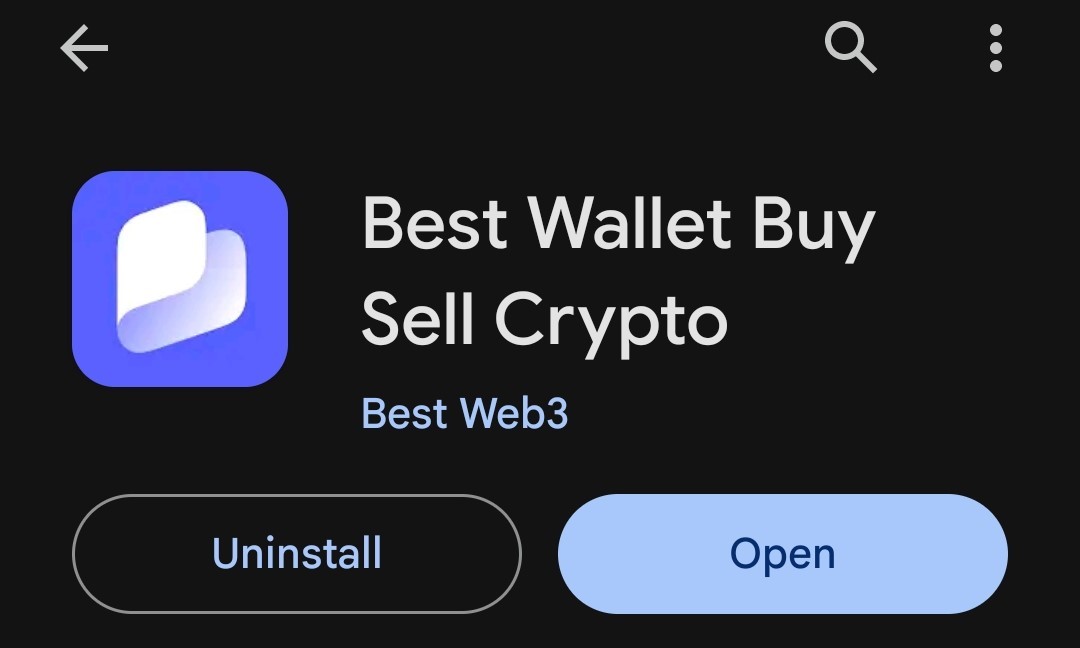
Step 2: Create Account
Users only need to input an active email address to create an account, as Best Wallet is decentralized and non-custodial and there is no KYC process to complete.
Next, users decide what security settings to add – a four-digit passcode is the minimum but there is the option to add two-factor authentication and/or fingerprint ID. This can also be added/removed later.
Step 3: Transfer or Buy ERC20 Tokens
A Best Wallet account has now been created and users will be redirected to the dashboard, where they can either purchase ERC20 tokens via third-party WERT or trade thousands of other tokens on the built-in DEX.
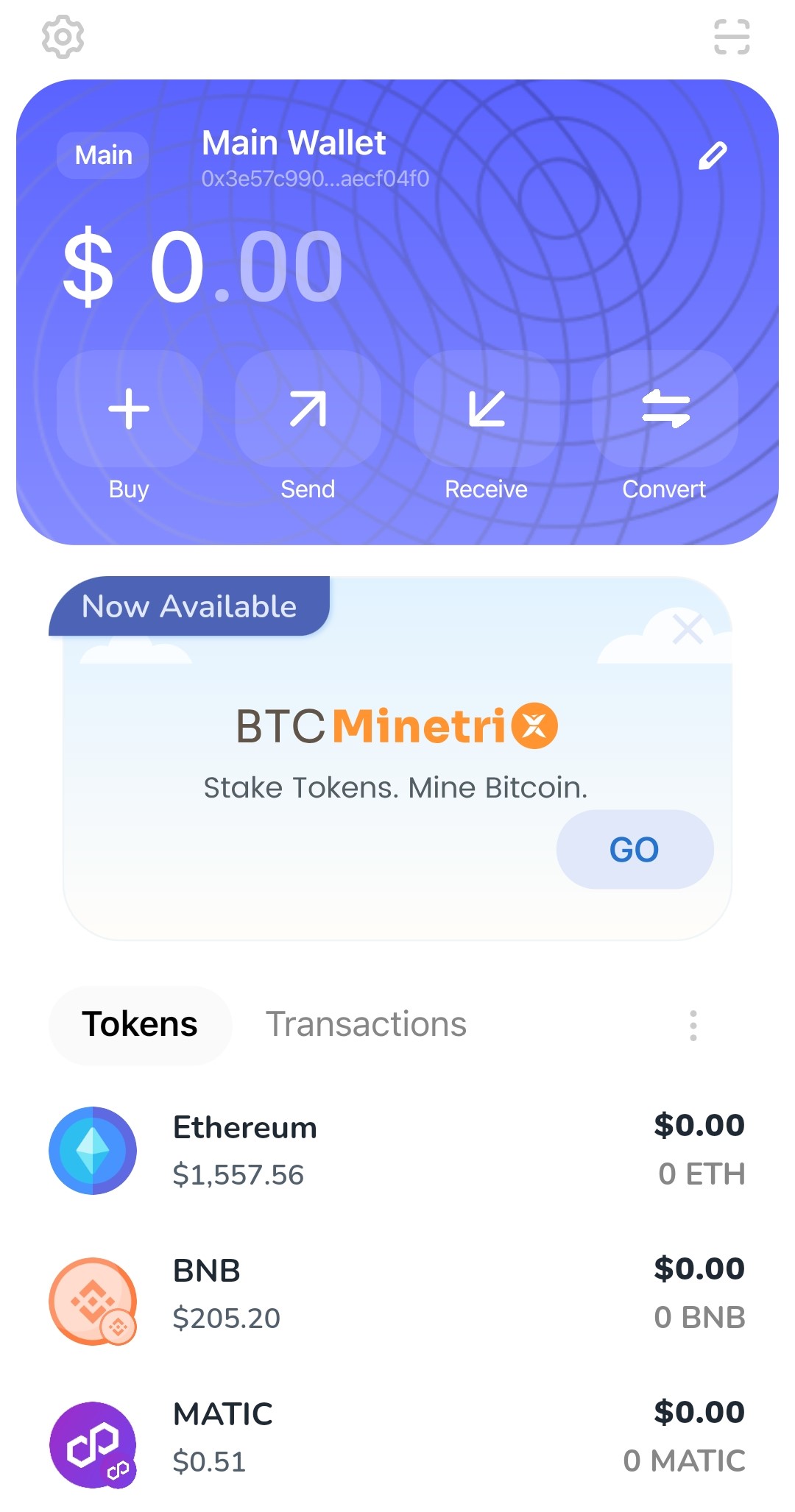
The Verdict
After reviewing the top ERC20 wallets for 2024, we found that Best Wallet is our top option.
This decentralized, non-custodial wallet has just launched as a free mobile app and gives users full control over managing their crypto holdings.
We also like that Best Wallet has numerous other features that make it more than just a wallet, including unique insights on tokens, early access to new projects and reduced fees while trading.
That is make possible by the $BEST token, which has not yet launched but will be airdropped to active users of the wallet in the near future.
References
- https://coinmarketcap.com/
- https://www.coinbase.com/blog/scaling-ethereum-crypto-for-a-billion-users
- https://ethereum.org/en/developers/docs/gas/
- https://support.simplex.com/hc/en-gb/articles/360014078420-What-fees-do-you-charge-for-card-payments
- https://docs.rocketpool.net/guides/staking/overview.html
- https://shop.ledger.com/pages/hardware-wallets-comparison
- https://mycoinify.com/fees/
- https://www.binance.com/en/fee/trading
- https://etherscan.io/gastracker
- https://www.swift.com/your-needs/financial-crime-cyber-security/know-your-customer-kyc/kyc-process
FAQs
What is an example of an ERC20 wallet?
ERC20 wallets support tokens on the Ethereum standard, and examples include Best Wallet, MetaMask, and Trust Wallet.
Where can I get an ERC20 wallet?
Dozens of ERC20 wallets can be downloaded for free as an app or browser extension, with leading examples including Best Wallet, Exodus, and MetaMask.
How do I know if I have an ERC20 wallet?
If the wallet is on the Ethereum blockchain and the receiving address starts with an ‘0x’, then it supports ERC20 tokens.
What is the best ERC20 wallet?
Overall, we like Best Wallet, which not only offers non-custodial storage for any ERC20 token, but also Bitcoin, XRP, Solana, and other major cryptocurrencies. It also has other unique features which make it more than just a non-custodial wallet.

